Équipe de recherche
Quantum Electronic Circuits Alps
The team focuses its research on experimental studies to reveal quantum effects in original and novel quantum nano-electronics devices
Goals
Since January 2019, the Quantum Electronic Circuits Alps team gathers researchers from the Quantum Coherence (CQ) and the NanoSpin teams. This merger is part of an ambitious effort to build a joint research group together with teams from CEA-IRIG and CEA-LETI in order to face the challenge of the rapidly developing field of Quantum Technologies. The joint research team focuses its research on experimental studies to reveal quantum effects in original and novel quantum nano-electronics devices.
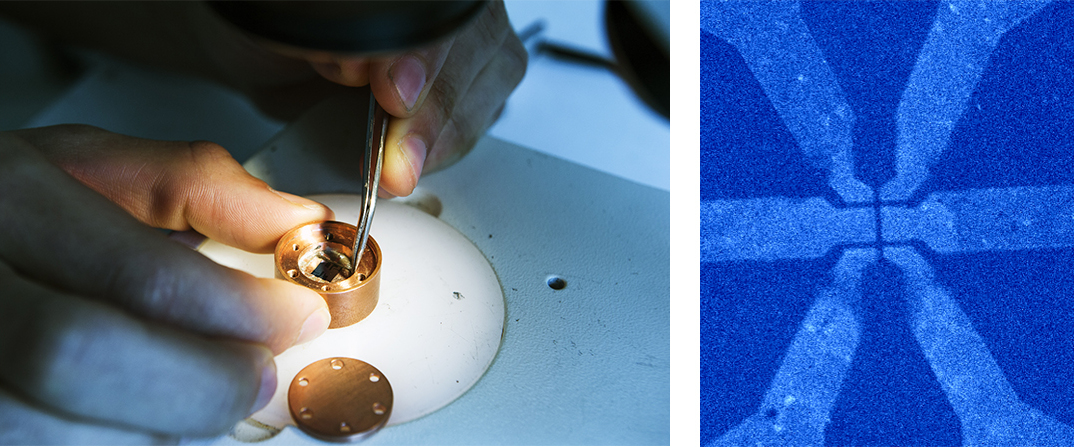
The team members share common research interests and develop original experimental techniques for electronic transport measurements and microwave techniques to observe and control new quantum effects in various different materials. The team’s specificity lies within the quantum nano-electronic circuit itself that defines the novel physics, the material used to build it and the measurement technology. To have access to quantum coherence effects in electronic systems and to their coherent manipulation, very stringent experimental conditions are required such as very low temperature, very low noise and weak measurement signals, microwave techniques as well as high quality nano-fabricated samples.
Original results from the team were obtained also thanks to a continuous effort to develop novel technology (Josephson-junction arrays, scanning probe experiments…) and novel high-quality nanostructures (topological insulators, epitaxially grown superconductors…). During the last 5 years, the team has been strongly involved in building novel experimental set-ups to control multi-qubit systems, to develop quantum-limited amplifiers, to develop opto-electronic techniques compatible with cryogenic environment and to develop cryogenic refrigerators. The team has significantly increased the number of its experimental sites. This was made possible thanks to a strong support of the NEEL technological groups, to grants through funded projects and also to the dynamism and commitment of permanent as well as non permanent researchers.
Overview
The QuantECA team focuses its research on experimental studies to reveal quantum effects in original and novel quantum nano-electronics devices. Its research activities can be decomposed into the following main topics:
- Superconducting qubits
Superconducting circuits including Josephson junctions, coupled to microwave photons - Quantum acoustics/nanomechanics
Preparing mechanical systems in well defined quantum states of motion - Spin qubits
Controlling individual spins in molecular magnets and 28Si-based CMOS circuits - Electronic flying qubits
Moving electrons as vehicles for coherent transfer of quantum information - Technical developments for quantum technologies
Single electron transistors as local probes for scanning-probe microscopy
Superconducting qubits
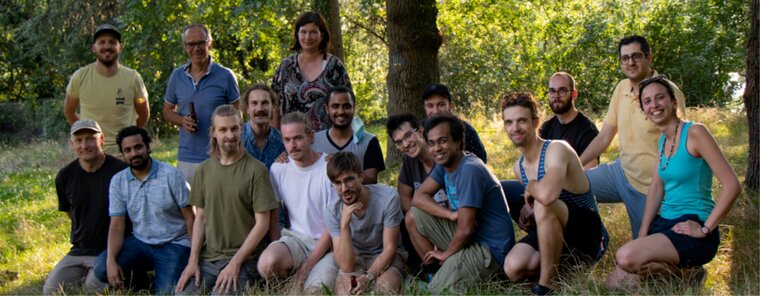
Olivier Buisson, Wiebke Hasch-Guichard, Cécile Naud and Nicolas Roch
Karthik Bharadwaj, Thibault Charpentier, Jovian Delaforce, Martina Esposito, Dorian Fraudet, Sébastien Leger, Vladimir Milchakov, Luca Planat, Kazi Rafsanjani, Arpit Ranadive
During the last decade, it has been demonstrated that superconducting circuits including Josephson junctions behave as quantum bits and are very well suited to realize advanced quantum mechanical experiments. These circuits appear as artificial atoms whose properties are defined by their electronic characteristics (capacitance, inductance and tunnel barrier).
Moreover, given their mesoscopic size, these quantum bits couple very strongly to electromagnetic radiation in the microwave range. Thus, it is now possible to perform quantum optics experiments using microwave photons and to unravel light-matter interactions using circuits.
In our group, we design and build novel superconducting quantum circuits. One aim is to develop the next generation superconducting qubits (with longer coherence time and/or higher read-out fidelity). We are also interested in using these circuits to explore phenomena that challenge the current understanding of quantum mechanics (e.g. quantum phase slips, quantum phase transition or quantum criticality). Finally we investigate the quantum limits of amplification and microwave detection using such superconducting quantum circuits (with a wealth of application in quantum sensing). These advanced experiments rely on nanofabrication, microwave measurement, very low noise electronics and very low temperature techniques. We benefit from the strong support of the technical groups in Néel Institute and from various national and international collaborations.
High fidelity quantum measurement in transmon qubits
We are studying non-demolition quantum measurements in a quantum system consisting of a superconducting quantum bit (a “qubit”) coupled to a radiative microwave field which carries the information to a classical detector. In an original experiment, we have developed a new coupling between the qubit and the microwave radiation field, called “cross-Kerr”. The qubit itself is realized by an aluminum superconducting circuit containing two Josephson tunnel junctions of submicron size. Electron-beam lithography was used to create a resin mask employed for defining the microwave circuit during thin-film evaporation of the aluminum. The superconducting properties of the circuit are essential for obtaining a non-dissipative microwave oscillator with quality factor as large as 105. In order that thermally-induced quantum fluctuations do not mix the two quantum states, the experiments must be performed at kBT ≪ ℏωqb. The oscillator is held at the very low temperature of 30 mK in a home-made dilution cryostat.
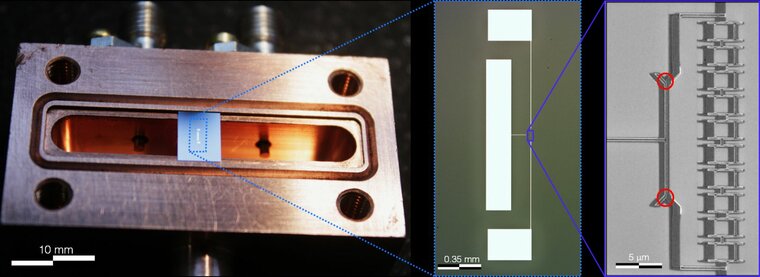
Collaborations: Tomás Ramos and Juan-José García-Ripoll, Quantum Information and Foundations Group, IFF-CSIC, Madrid, Spain.
Publications:
A V-shape superconducting artificial atom based on two inductively coupled transmons, É. Dumur, B. Küng, A. K. Feofanov, T. Weissl, N. Roch, C. Naud, W. Guichard, O. Buisson, arXiv:1501.04892, Phys. Rev. B 92, 020515(R) (2015).
Fast high fidelity quantum non-demolition qubit readout via a non-perturbative cross-Kerr coupling, R. Dassonneville, T. Ramos, V. Milchakov, L. Planat, E. Dumur, F. Foroughi, J. Puertas,S. Leger, K. Bharadwaj, J. Delaforce, C. Naud, W. Hasch-Guichard, J. J. Garcıa-Ripoll, N. Roch, and O. Buisson, Phys. Rev. X 10, 011045 (2020).
Fundings: ANR REQUIEM
3D and 2D Fluxonium
We have developed several circuits of the Fluxonium qubit. We are analysing the different loss mechanism in this superconducting qubit depending whether it is measured in a 3D or 2D configuration.
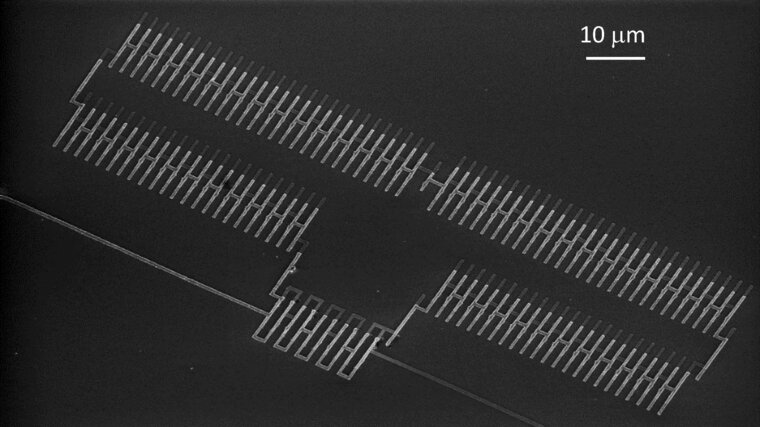
Collaborations:
Gianluca Rastelli, University of Konstanz, Germany
Ioan Pop, Karlsruhe Institute of Technology, Germany
Funding: ERC FreqJoc, COFUND Greque
Propagating modes and quantum phase slips in long Josephson junction chains
By making arrays of Josephson junction, we can obtain a new type of metamaterials: high impedance and tunable transmission lines. We are studying the dynamics of these chains of Josephson junctions. Plasma modes propagating along the chains have been experimentally and theoretically analyzed as well as their Kerr nonlinearities. In particular we have studied the dispersion and non-linear self- and cross-Kerr frequency shifts of plasma modes in a one-dimensional Josephson junction chain containing 500 SQUIDs in the regime of weak nonlinearity. In the strong quantum fluctuation regime, we studied the effect of the quantum phase slips.
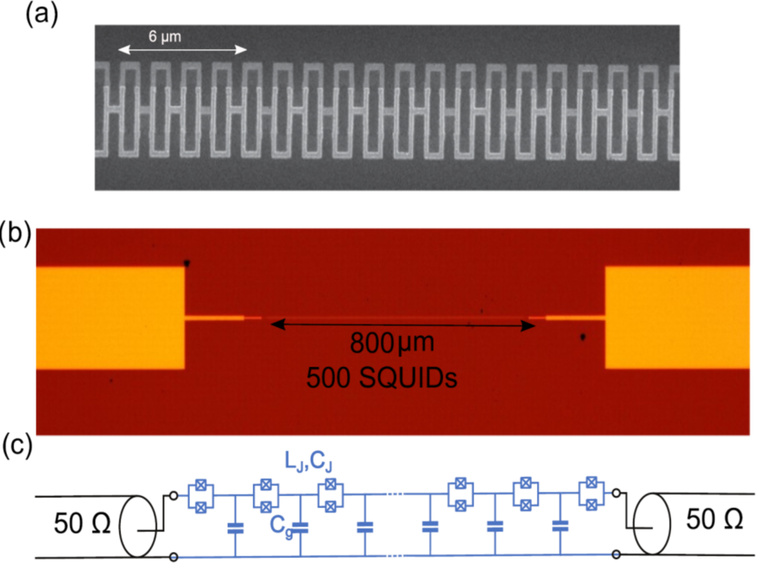
Publications:
Kerr coefficients of plasma resonances in Josephson junction chains, Thomas Weißl, Bruno Küng, Étienne Dumur, Alexey K. Feofanov, Iulian Matei, Cécile Naud, Olivier Buisson, Frank W. J. Hekking, Wiebke Guichard, Phys. Rev. B 92, 104508, (2015).
Kerr nonlinearity in a superconducting Josephson metamaterial. Yu. Krupko, V. D. Nguyen, T. Weissl, E. Dumur, J. Puertas, R. Dassonneville, C. Naud, F. W. J. Hekking, D. Basko, O. Buisson, N. Roch, W. Guichard, Phys. Rev. B 98, 094516 (2018) (2018).
Fundings: ERC FrequJoc
Many-body quantum optics with superconducting circuits
The use of superconducting circuits as building blocks for studying light matter interactions at the fundamental level was introduced more than a decade ago and is named Circuit Quantum ElectroDynamics (circuitQED). With this project we are pushing these ideas to the next level and building circuits to explore many-body quantum optics.
To reach this novel physics, we have developed a unique quantum platform based on superconducting qubits coupled to plasma modes propagating inside an extended Josephson junctions chain. By tailoring the properties of this metamaterial (more specifically its characteristic impedance), we can enhance the qubit-plasma modes coupling up to the ultra-strong coupling regime.
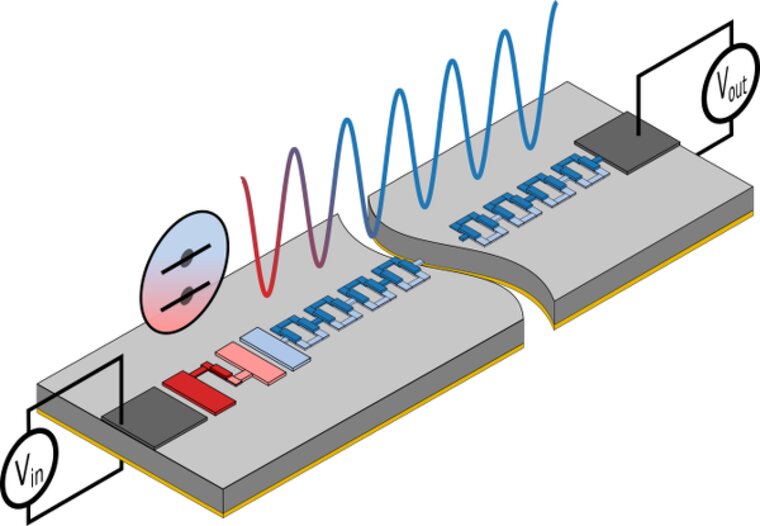
Publications:
Observation of quantum many-body effects due to zero point fluctuations in superconducting circuits, S. Leger, J. Puertas Martínez, K. Bharadwaj, R. Dassonneville, J. Delaforce, F. Foroughi, V. Milchakov, L. Planat, O. Buisson, C. Naud, W. Hasch-Guichard, S. Florens, I. Snyman, and N. Roch, Nature Communications 10, 5259 (2019), Arxiv | Nat. Commun.
A tunable Josephson platform to explore many-body quantum optics in circuit-QED, J. Puertas Martinez, S. Leger, N. Gheereart, R. Dassonneville, L. Planat, F. Foroughi, Y. Krupko, O. Buisson, C. Naud, W. Guichard, S. Florens, I. Snyman, N. Roch, npj Quantum Information 5, 19 (2019), Arxiv | npj Quantum Information
Particle production in a waveguide ultra-strongly coupled to a qubit, N. Gheeraert, X. H. H. Zhang, S. Bera, N. Roch, H. U. Baranger and S. Florens, Physical Review A 98, 43816 (2018), Arxiv | Phys. Rev. A
Fundings: ANR CLOUD, LANEF, ANR BOCA, QuantERA SiUCs
Near quantum limited amplifiers
Measuring these microwave photons with very high quantum efficiency remains a tremendous challenge, since the energy conveyed by one single microwave photon is hundreds thousand times smaller than the one of usual optical photons. Yet signals at the single-photon level can be measured using Josephson parametric amplifiers.
In our team we are now using superconducting metamaterials (see figure) to engineer the next generation of parametric amplifiers. These new devices allow us to explore the quantum limits of amplification as well as to perform quantum optics experiments.
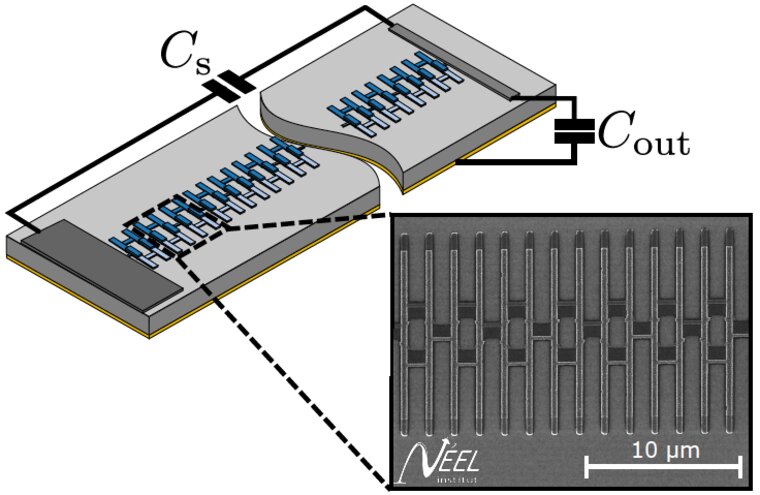
Publications:
A photonic crystal Josephson traveling wave parametric amplifier, L. Planat, A. Ranadive, R. Dassonneville, J. Puertas Martínez, S. Leger, C. Naud, O. Buisson, W. Hasch-Guichard, D. M. Basko, and N. Roch, Physical Review X 10, 021021 (2020) Arxiv | Phys. Rev. X. See also Physics Synopis: A Simple Solution for Microwave Amplification and CNRS la lettre innovation: Un amplificateur quantique pour la lecture des bits quantiques.
Non-degenerate parametric amplifiers based on dispersion engineered Josephson junction arrays, P. Winkel, I. Takmakov, D. Rieger, L. Planat, W. Hasch-Guichard, L. Grünhaupt, N. Maleeva, F. Foroughi, F. Henriques, K. Borisov, J. Ferrero, A. V. Ustinov, W. Wernsdorfer, N. Roch, and I. M. Pop, Physical Review Applied 13, 024015 (2020), Arxiv | Phys. Rev. Applied
Fabrication and characterization of aluminum SQUID transmission lines, L. Planat, E. Al-Tavil, J. Puertas Martínez, R. Dassonneville, F. Foroughi, S. Leger, K. Bharadwaj, J. Delaforce, V. Milchakov, C. Naud, O. Buisson, W. Hasch-Guichard, and N. Roch, Physical Review Applied 12, 064017 (2019), Arxiv | Phys. Rev. Applied
Understanding the saturation power of Josephson Parametric Amplifiers made from SQUIDs arrays, L. Planat, R. Dassonneville, J. Puertas Martínez, F. Foroughi, O. Buisson, W. Hasch-Guichard, C. Naud, R. Vijay, K. Murch, and N. Roch, Physical Review Applied 11, 034014 (2019), Arxiv | Phys. Rev. Applied
Fundings: ANR CLOUD, LANEF, ANR BOCA, QuantERA SiUCs
Hybrid Al/Ge super/semi-conducting crystalline nanowire heterostructures
Hybrid superconducting-semiconducting systems are promising candidates for nano-electronic quantum devices including qubits and quantum circuits. In collaboration with the Institute of Solid-State Electronics at TU Wien, Vienna, Austria and IRIG/LEMMA in CEA Grenoble, we have fabricated and characterised hybrid nanowire aluminium/germanium/aluminium heterostructures. A novel annealing technique allows to reach atomically precise interfaces. Measuring at low temperature, we have demonstrated the exceptional electrical transport characteristics of these high-quality nanowires heterostructures. By tuning with a single gate, we observe from single hole quantum dot to Josephson effect regimes.
Having overcome the limitations of interface defects, the presented results establish Ge quantum dots in an hybrid superconductor-semiconductor Al-Ge-Al nanowire heterostructures as potentially interesting platform for the study of Majorana zero modes and key components of quantum computing such as gatemons qubits or gate tunable SQUIDS.
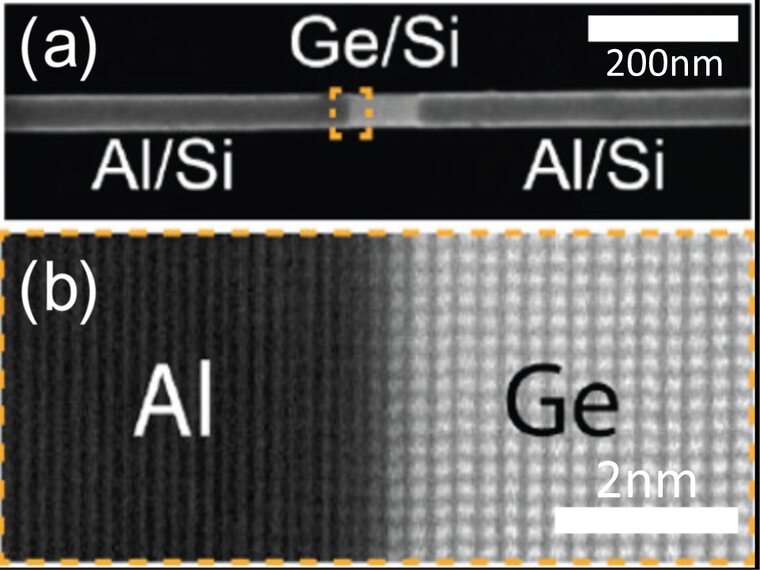
Collaborations: Alois Lugstein and Masiar Sistani, Institute of Solid-State Electronics at TU Wien, Vienna, Austria
Publications:
Highly transparent contacts to the 1D hole gas in ultra-scaled Ge/Si core/shell nanowires, M. Sistani, J. Delaforce, R. Kramer, N. Roch, M.A. Luong, M.I. den Hertog, E. Robin, J. Smoliner, J. Yao, C.M. Lieber, C. Naud, A. Lugstein, O. Buisson, ACS Nano 13, 12, 14145-14151 (2019).
Coulomb blockade in monolithic and monocrystalline Al-Ge-Al nanowire heterostructrures” by M. Sistani, J. Delaforce, K. Bharadwaj, M. Luong, J. Nacenta, N Roch, M. den Hertog, R. Kramer, O. Buisson, A. Lugstein and C. Naud, , Appl. Phys. Lett. 116, 013105 (2020).
Fundings: ANR QPSNanowires, COFUND Greque
Quantum acoustics/nanomechanics
The motion and the vibration of objects are phenomena we experience every day. But how does this translate at the quantum scale, when motion is governed by quantum mechanics? This question can now be investigated experimentally, with nano- and micro-objects being prepared in quantum states of motion. Acoustic/mechanical systems also play an essential role in quantum technologies, for instance as quantum interconnects or quantum sensors. In our team, we build and operate devices both for the development of such novel quantum technologies and for the investigation of fundamental aspects.
PhD students: Abel Hugot, Quentin Greffe.
Permanent staff: Jérémie Viennot, Julien Renard
In collaboration with Guillaume Jourdan (CEA Leti), Nicolas Roch and Franck Balestro.
Funding: ANR Q-MagMech, ANR STOUT
Hybrid quantum acoustics
Controlling acoustic phonons at the quantum scale is opening up exciting new experimental avenues. In our lab, the key ingredient to achieve this control is the piezoelectric effect, which directly couples acoustic circuits with superconducting microwave circuits. Based on this technology, we develop hybrid circuits and we design them for specific aims: coupling to solid-state spins, control of non-linearities using Josephson junctions, etc. These experiments happen on chips fabricated in-house, measured at very low temperature (few mK) and microwave frequency (few GHz).
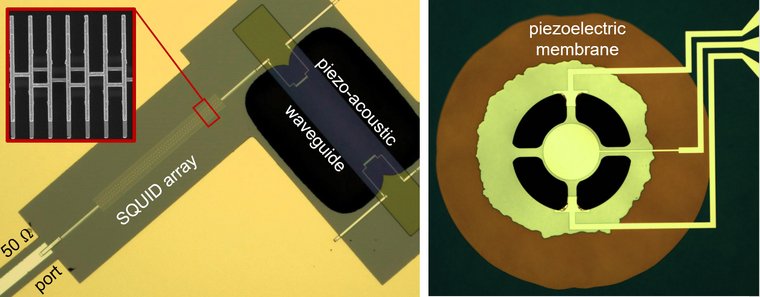
Coherent microwave-to-optical transduction
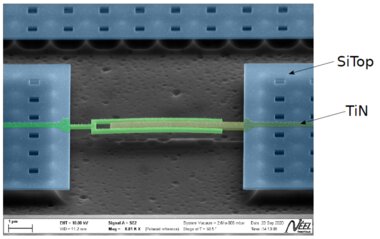
Superconducting qubits are one of the leading platform in experimental quantum information science. One roadblock to scale up these devices, which operate at microwave frequencies, is the lack of a coherent quantum channel to transport quantum information over long distances. At optical frequencies, such a channel is naturally available but optical light is not compatible with superconducting qubits. However, nano- and micro-mechanical oscillators can couple coherently both to microwave and optical photons. We develop such nanomechanical devices, with the aim to enable reversible and coherent transduction between microwave and optical photons.
Spin Qubits
An electronic spin in silicon 28 exhibits outstanding coherence properties and large-scale prospects for integration. Its main assets for scalability are immediate compatibility with CMOS technologies on one hand and effective sizes of spin qubits with all their quantum functionalities below the μm on the other hand.. Our objective is to explore the possibilities of scaling up and designing circuits with a large number of qubits made with CMOS technology. In the long term, we want to implement spin-based quantum digital computation in silicon and demonstrate quantum supremacy over classical computing for certain types of problems.
Key experiments have shown that the spin lifetime and coherence time can be adapted by appropriate molecular engineering indicating potentiality for quantum technologies. Moreover, molecular magnets provide access to state of-the-art qudits. These multi-level devices can be used to emulate processes involved in quantum spin manipulation. The use of qudits could also simplify the required circuits to fabricate the quantum computer itself. However, the future of molecular magnets for quantum information processing may be conditioned by our ability to propose scalable architectures and to speed-up our readout technique. The readout of nuclear spin states needs to be speed-up.. To achieve this acceleration of the readout cycle, different detection schemes are proposed. To this end, electron spin resonance technique and coupling to superconducting resonator are investigated.
Molecular Spin Qubits
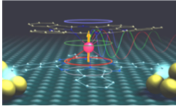 Key experiments have shown that the spin lifetime and coherence time can be adapted by appropriate molecular engineering indicating potentiality for quantum technologies. Moreover, molecular magnets provide access to state of-the-art qudits. These multi-level devices can be used to emulate processes involved in quantum spin manipulation. The use of qudits could also simplify the required circuits to fabricate the quantum computer itself. However, the future of molecular magnets for quantum information processing may be conditioned by our ability to propose scalable architectures and to speed-up our readout technique. The readout of nuclear spin states needs to be speed-up.. To achieve this acceleration of the readout cycle, different detection schemes are proposed. To this end, electron spin resonance technique and coupling to superconducting resonator are investigated.
Key experiments have shown that the spin lifetime and coherence time can be adapted by appropriate molecular engineering indicating potentiality for quantum technologies. Moreover, molecular magnets provide access to state of-the-art qudits. These multi-level devices can be used to emulate processes involved in quantum spin manipulation. The use of qudits could also simplify the required circuits to fabricate the quantum computer itself. However, the future of molecular magnets for quantum information processing may be conditioned by our ability to propose scalable architectures and to speed-up our readout technique. The readout of nuclear spin states needs to be speed-up.. To achieve this acceleration of the readout cycle, different detection schemes are proposed. To this end, electron spin resonance technique and coupling to superconducting resonator are investigated.
Silicon 28 qubits
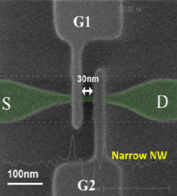 An electronic spin in silicon 28 exhibits outstanding coherence properties and large-scale prospects for integration. . Its main assets for scalability are immediate compatibility with CMOS technologies on one hand and effective sizes of spin qubits with all their quantum functionalities below the μm on the other hand.. Our objective is to explore the possibilities of scaling up and designing circuits with a large number of qubits made with CMOS technology. In the long term, we want to implement spin-based quantum digital computation in silicon and demonstrate quantum supremacy over classical computing for certain types of problems.
An electronic spin in silicon 28 exhibits outstanding coherence properties and large-scale prospects for integration. . Its main assets for scalability are immediate compatibility with CMOS technologies on one hand and effective sizes of spin qubits with all their quantum functionalities below the μm on the other hand.. Our objective is to explore the possibilities of scaling up and designing circuits with a large number of qubits made with CMOS technology. In the long term, we want to implement spin-based quantum digital computation in silicon and demonstrate quantum supremacy over classical computing for certain types of problems.
Electronic flying Qubits
Coherent manipulation of single electrons in solid-state devices is attractive for quantum information purposes because they have a high potential for scalability. Depending on the system used, the charge or the spin may code binary qubit information. A particular appealing idea is to use a single flying electron itself as the conveyor of quantum information. Such electronic flying qubits allow performing quantum operations on qubits while they are being coherently transferred.
Information processing typically takes place in the nodes of the quantum network on locally controlled qubits, but quantum networking would require flying qubits to exchange information from one location to another. It is therefore of prime interest to develop ways of transferring information from one node to the other. The availability of flying qubits would enable the possibility to develop new non-local architectures for quantum computing with possibly cheaper hardware overhead than e.g. surface codes. The aim of our research is to establish a unique innovative platform for creating, manipulating and detecting single-electron wave packets in semiconductor quantum circuits and exploit them for quantum technologies.
This will include the development of (i) a picosecond on-demand coherent single-electron source and (ii) single-shot detection of propagating SEWP at the discrete charge level. With these technological breakthroughs we will be able to address (iii) quantum interferometry at the single-charge level. We will demonstrate the elementary building blocks that will be used for implementing a flying quantum bit. This will be combined with (iv) the development of a new software for predictive simulation and optimization of ultrafast quantum devices in collaboration with CEA Grenoble.
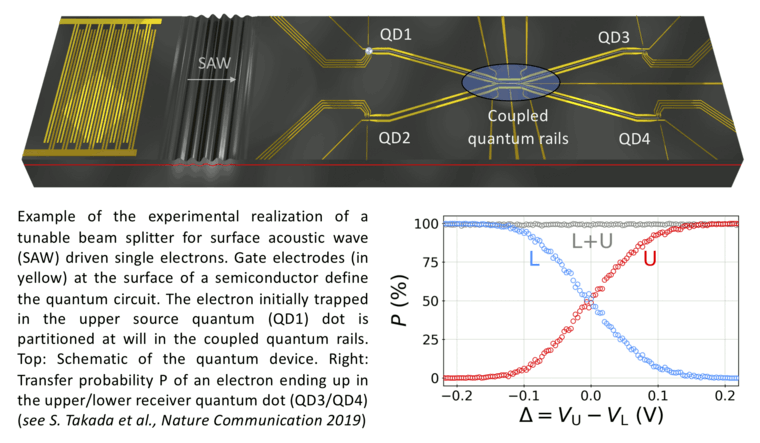
Further reading:
C. Bäuerle, D. C Glattli, T. Meunier, F. Portier, P. Roche, P. Roulleau, S. Takada, X. Waintal, Coherent control of single electrons : a review of current progress, Rep. Prog. Phys. 81 056503 (2018)
C. Bäuerle, T. Meunier and C. J. B. Ford, in Surface acoustic wave roadmap, Topical Review, J. Phys. D : Appl. Phys. 52 353001 (2019)
Collaboration and networking:
nanoelectronics group, Saclay (C. Glattli & P. Roulleau)
theory group, CEA Grenoble (X. Waintal & C. Groth)
Quantum Metrology Laboratory, AIST, Tsukuba, Japan (S. Takada & N. Kaneko)
RIKEN, Japan (M. Yamamoto)
Ruhr-Universität Bochum, Germany (A.D. Wieck)
Funding: ANR, H2020-FET-OPEN
Technical developments for Quantum Technologies
Single electron transistor microscopy of two dimensional electron systems
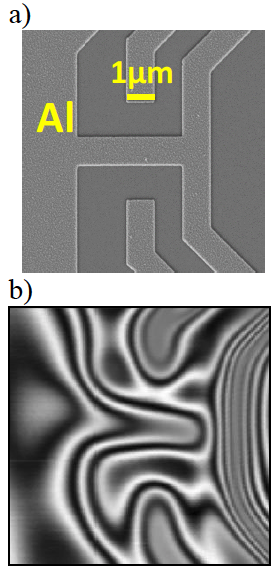
a) Test sample with Al electrostatic gates b) Scanning single electron transistor image of the test sample.
A number of phenomena in condensed matter physics lead to an inhomogeneous distribution of a physical quantity. For example, the flux distribution in superconductors or the electron density of states of a semiconductor. A direct visualisation of these inhomogeneous states is often the only way to reveal their existence. In a bulk measurement without spatial resolution these effects may stay hidden. Scanning probe microscopy allows the visualization of a physical quantity by scanning the surface of interest with a very small detector or probe. The images represent high resolution maps of the specific property probed by the detector. Today these techniques are a key tool in nanoscience and nanotechnology.
In this project, we use a scanning single electron transistor microscope at low temperatures (< 300 mK) and high magnetic fields (0–18 T). This microscope has been recently developed at Néel Institute and is now fully operational. The probe, a single electron transistor, allows very sensitive electric charge detection at the nanoscale. With such a scanning probe microscope most of the two-dimensional electron systems can be studied. Some prominent systems are edge channels in the quantum Hall regime, surface states of three dimensional topological insulators or inhomogeneous electronic states close to a metal-insulator phase transition.
Transport measurements can be done simultaneously in situ which allows a careful characterisation of the sample close to a phase transition. A direct visualisation of these states are key to the fundamental understanding of these phenomena.
Techniques
Nanofabrication
In PTA and Nanofab clean rooms, both at Grenoble, we have access to state of the art clean-room facilities:
- 100 keV e-beam writer (PTA Grenoble)
- 20 keV e-beam writer (Nanofab)
- Laser lithography (Nanofab)
- MJB3 optical lithography system (Nanofab and PTA)
- Dry etching: ICP, IBE, deep ICP, Cl ICP…
- Various types of evaporators, with different condition (ultra-high vacuum, with preparation Ag chamber, multi evaporation…)
- Sputtering machine for oxides and metals
Cryogenics
Our group is specialized in transport measurement at very low temperatures. This requires skills in cryogenics and specific wiring. Here are some examples of dilution fridges :
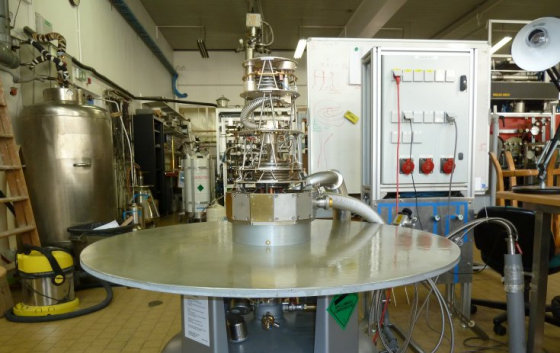 |
Dilution fridge called “SIONLUDI” This is an inverted fridge with large space for RF electronics and a base temperature close to 20 mK (cooling power: 250 µW). It is wired with 8 RF coax lines, 16 thermocoax wires and 27 manganine wires filtered with ECOSORB. It is equipped with a small, fast magnet that can generate a magnetic field up to 1 T. |
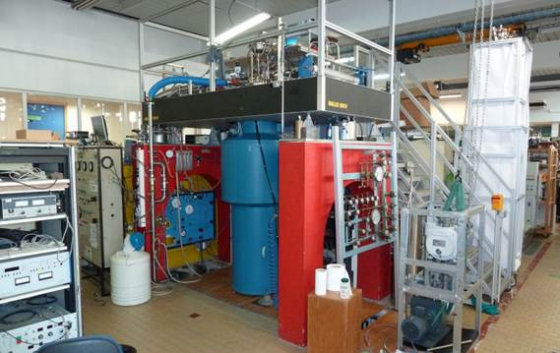 |
Dilution fridge called “WODAN” This is a wet dilution fridge with large space for RF electronics and a base temperature close to 20 mK (cooling power: 1 mW). It is wired with 8 RF coax lines and 27 thermocoax wires. It is equipped with a two axis magnet 6 T/3 T |
Electronics
In collaboration with the “pôle electronique” of the Néel Institute, we are developing low noise electronics (such as current amplifiers, low noise and highly stable DACs, voltage amplifiers) but also RF electronics (such as RF amplifiers, RF-DACs).
Education
Master degree courses
- Quantum mechanics 1: Laurent Saminadayar (24h), Master PMCR.
- Introduction to nanoscience: Laurent Lévy (24h), Master PMCR
- Theory of transport: Wiebke Guichard (24h), Master PMCR
- Introduction to mesoscopic phyiscs: Tristan Meunier (24h), Master Nanoscience, keywords : Quantum mechanics in nanocircuits, quantum interference, electrons, quantum dots, Balistic transport
Collaborations
Grenoble collaborations
- IMEP-LAHC (semiconductor transport, NEMS)
- TIMA (semiconductor surface acoustic wave)
- LPMMC (superconducting circuit theory)
- LETI-DOPT (Topological insulators, growth) Theory at SPSMS-CEA Grenoble (semiconductor transport theory)
- SIMAP (Growth of superconducting film)
- INAC (experiment on superconducting circuit)
National collaborations
- Condensed matter group of ENS Lyon (Spin Glass and topological insulator theory)
- LPTHE (Paris, Superconducting ciruit theory)
- LMMP (Theory on superconducting circuits)
International collaboration
- Tarucha group (Tokyo University, Japan, semiconductor transport)
- Bluhm group (RTW AAchen, Germany, semiconductor transport)
- Santos group (Paul Drude Institute, Germany, semiconductor surface acoustic wave)
- Costi group (Juelich, Germany, theory on semiconductor transport)
- Von Delft group (RTW AAchen, Theory on semiconductor transport)
- De Heer group (Univerity of Atlanta, USA, Graphene on SiC)
- IOP-CAS (China, superconducting circuits)